Understanding Classic Fine Foods Malaysia in the Context of BCM: A Strategic Guide to Business Continuity Planning
Chapter 1
Introduction to BCM Implementation for Classic Fine Foods Malaysia
The Importance of Business Continuity for Classic Fine Foods Malaysia
In today's rapidly evolving business landscape, ensuring resilience and continuity in operations is a critical priority.
.jpg?width=322&height=322&name=Classic%20Fine%20Foods%20Malaysia%20business%20continuity%20planning%20(1).jpg) For Classic Fine Food (CFF) Malaysia, a leading provider of premium and gourmet food products, sustaining business functions despite disruptions is essential to maintaining service excellence and meeting customer expectations.
For Classic Fine Food (CFF) Malaysia, a leading provider of premium and gourmet food products, sustaining business functions despite disruptions is essential to maintaining service excellence and meeting customer expectations.
Whether facing supply chain disruptions, natural disasters, economic downturns, or operational risks, implementing a well-structured Business Continuity Management (BCM) framework is crucial for safeguarding CFF Malaysia’s reputation, financial stability, and long-term sustainability.
Purpose of This Book
This eBook, Driving Business Continuity: Implementing BCM for Classic Fine Foods Malaysia, is designed to serve as a practical guide for professionals responsible for business continuity planning within the organisation.
This book tailors BCM principles to CFF Malaysia’s unique operational landscape. It provides a structured approach to identifying risks, setting objectives, and implementing effective continuity strategies.
Divided into two main sections, the book ensures a comprehensive understanding of both the strategic and operational aspects of BCM implementation:
- Understanding Classic Fine Foods Malaysia in the Context of BCM: A Strategic Guide to Business Continuity Planning
- Implementing Business Continuity: A Step-by-Step Guide for Classic Fine Foods Malaysia
CFF Malaysia will be equipped with the tools and insights to develop, implement, and sustain a robust BCM framework tailored to its business needs through this structured approach.
Overview of Section 1: Understanding Classic Fine Food Malaysia in the Context of BCM
Before implementing a BCM program, it is imperative first to understand the organization’s core functions, objectives, and potential vulnerabilities.
This section provides a strategic overview of CFF Malaysia’s business operations, guiding readers through key foundational elements required for an effective BCM strategy:
1. Introducing BCM for Classic Fine Foods Malaysia
This chapter introduces the fundamentals of Business Continuity Management (BCM) and outlines its importance in ensuring CFF Malaysia's resilience.
It highlights the benefits of proactive planning and the potential risks of failing to implement a BCM strategy.
2. Understanding Classic Fine Food Malaysia
An in-depth look at CFF Malaysia’s business model, operations, and key stakeholders.
This chapter examines how the company functions and identifies critical areas that require protection under a BCM framework.
3. Identifying BCM Goals
Establishing clear goals is essential for BCM implementation.
This chapter defines what CFF Malaysia aims to achieve with its business continuity strategy, including ensuring customer satisfaction, protecting revenue streams, and maintaining supplier relationships.
4. Establishing BC Objectives
This section builds upon the goals and translates them into measurable objectives, such as minimising downtime, ensuring regulatory compliance, and safeguarding supply chain integrity.
5. Determining BC Assumptions
Every BCM plan operates under assumptions, such as the availability of alternative suppliers, operational redundancies, and IT system recoverability. This chapter outlines key assumptions that will shape CFF Malaysia’s BCM framework.
6. Developing BCM Team Composition
A successful BCM program requires a well-defined team structure. This chapter details the roles and responsibilities of key personnel involved in business continuity planning, response, and recovery.
7. Analysing the Operating Environment
An assessment of CFF Malaysia’s external and internal operating environment, considering factors such as regulatory requirements, industry standards, and market conditions that could impact business continuity.
Overview of Section 2: Implementing Business Continuity – A Step-by-Step Guide for Classic Fine Food Malaysia
This section outlines a comprehensive BCM planning methodology tailored for CFF Malaysia.
The methodology consists of seven critical phases, each contributing to the overall resilience of the organisation. These phases include:
- Project Management (PM) – Establishing a structured approach to BCM implementation, defining objectives, scope, and governance.
- Risk Analysis and Review (RAR) – Identifying potential threats, vulnerabilities, and their impact on business operations.
- Business Impact Analysis (BIA) – Assessing disruptions' financial, operational, and reputational consequences.
- Business Continuity Strategy (BCS) – Developing strategic responses to ensure essential business functions can continue during crises.
- Plan Development (PD) – Documenting detailed response and recovery plans tailored to Classic Fine Food Malaysia’s operational needs.
- Testing and Exercising (TE) – Conducting drills and simulations to validate the effectiveness of the BCM plan.
- Program Management (PgM) – Establishing a framework for ongoing BCM governance, maintenance, and continuous improvement.
Each phase ensures that CFF Malaysia can proactively manage risks and respond effectively to disruptions.
This section provides detailed guidance on implementing these phases, offering practical insights, industry best practices, and real-world applications relevant to the organization’s business environment.
By adopting this structured approach, CFF Malaysia can build a resilient business model, safeguard its supply chain, and maintain customer trust even in times of crisis.
The following chapters will detail each phase, providing a clear roadmap for successfully implementing Business Continuity Management.
Who Should Read This Book?
This eBook is intended for business leaders, risk management professionals, operations managers, and all stakeholders responsible for ensuring continuity in CFFM’s supply chain and service delivery.
Whether new to BCM or looking to refine your organisation’s resilience strategy, this guide will provide actionable insights tailored to CFF Malaysia's needs.
Summing Up …
In an increasingly unpredictable business environment, resilience is no longer optional but necessary.
By proactively implementing a BCM framework, CFF Malaysia can strengthen its ability to respond to disruptions, minimise downtime, and deliver exceptional customer service. This eBook serves as a roadmap for achieving business continuity success, ensuring that CFFM remains a trusted leader in the food distribution industry.
Let’s embark on this journey to resilience and continuity together.
This chapter is part 1 of the eBook "Driving Business Continuity: Implementing BCM for Classic Fine Food Malaysia." It is titled "Understanding Classic Fine Foods Malaysia in the Context of BCM: A Strategic Guide to Business Continuity Planning", which provides a comprehensive guide to implementing a BCM system in alignment with ISO 22301
| Driving Business Continuity: Implementing BCM for Classic Fine Food Malaysia | |||
| Understanding CFF Malaysia in the Context of BCM: A Strategic Guide to BCP | |||
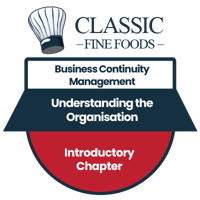 |
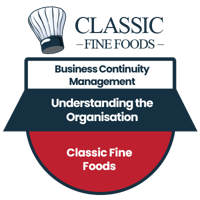 |
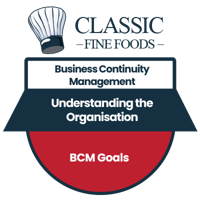 |
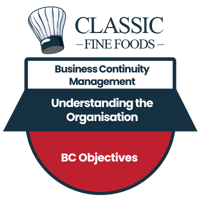 |
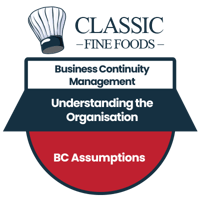 |
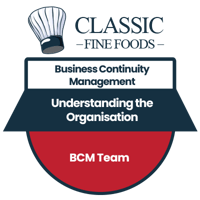 |
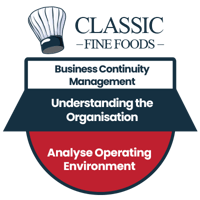 |
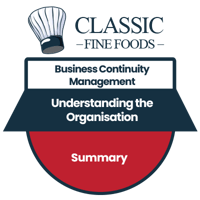 |
More Information About Business Continuity Management Courses
To learn more about the course and schedule, click the buttons below for the BCM-300 Business Continuity Management Implementer [BCM-3] and the BCM-5000 Business Continuity Management Expert Implementer [BCM-5].





![Register [BL-B-3]*](https://blog.bcm-institute.org/hs-fs/hubfs/hub_generated/resized/19a8306f-6b76-45ff-8585-95111f393aeb.png?width=200&height=56&name=19a8306f-6b76-45ff-8585-95111f393aeb.png)



![FAQ [BL-B-3]](https://blog.bcm-institute.org/hs-fs/hubfs/hub_generated/resized/9b7f5669-8ad6-450b-a98f-5f5d49ebfc8e.png?width=150&height=150&name=9b7f5669-8ad6-450b-a98f-5f5d49ebfc8e.png)
![Email to Sales Team [BCM Institute]](https://blog.bcm-institute.org/hs-fs/hubfs/hub_generated/resized/83ae9ad3-affc-416e-8f51-64218d6d98f2.png?width=100&height=100&name=83ae9ad3-affc-416e-8f51-64218d6d98f2.png)





